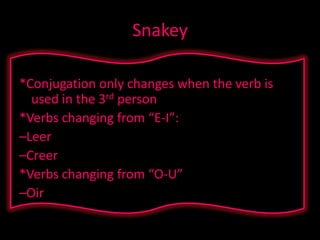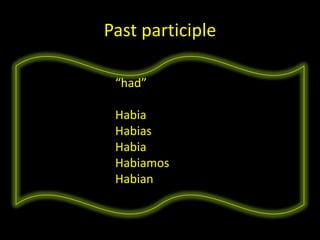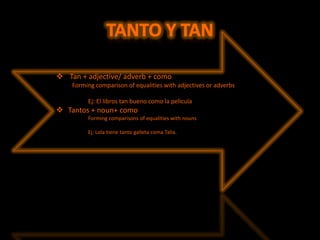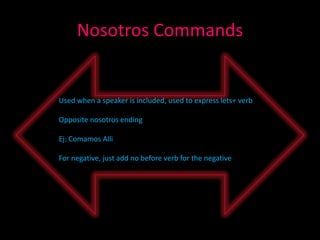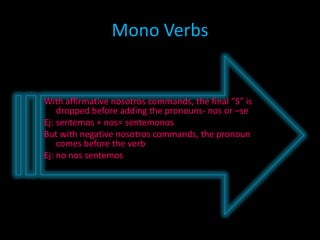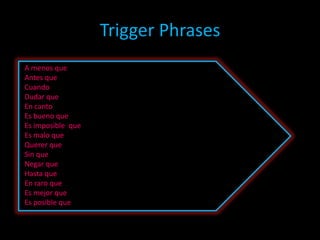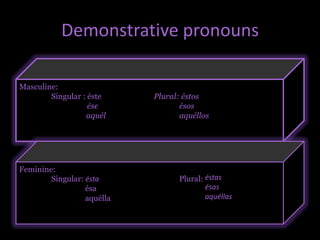Grammar book
- 1. Grammar Book Talia Bowen Spanish 3 Honors
- 2. Table of Contents Pretérito TriggerWordsforthepreteriteCar- Gar-Zar SpockVerbsCucaracha VerbsSnake SnakeyImperfectTriggerwordsforImperfectIrregularsPreterite Vs. ImperfectSer Vs. Estar Verbslike gustar Comparative/ SuperlativeConnectingVerbsFutureTriggerWordsforFutureIrregular PorPara Conditional/ Irregulares Conditional/ Irregular 24) Perfect Tense -Present -Past - PresentPerfect irregular25) Subjunctive26) Tanto & Tan 27) Impersonal “se”28) Saber vs Conocer 29)Los Mandatos 30)Informal/ Formal 31) Affirmative32)Negative33) Irregular 34)D.O.P/ I.O.P placement35) TriggerPhrases36) Impersonal expressionsExpressions of EmotionsConjunctions of Time DemonstrativeAdjectivesDemonstrativePronouns.
- 3. Pretérito: thecompletedpast tense action. Foractionsthatwererepeated a specificnumber of times. Tostatethebeginningortheend of anaction. Foranactionthatoccuredduring a specificperiod of time. Foractionsthat can beviewed as single events. Specific. yo -
- 4. Tu -ASTE
- 5. El, ella -
- 6. Nosotros -AMOS
- 7. Ellos -ARON ÉÍ
- 8. ISTE
- 9. IÓ
- 10. IMOS
- 11. IERON ÍÓ
- 12. Trigger Words Ayer ………………….yesterdayLa semana pasada..lastweekAnoche ……………..lastnightel mes pasado…….lastmonthel otro día………….theotherdayel año pasado……..lastyearentonces…………….thenhace dos días, años…twodays , yearsagoesta mañana……….thismorningayer por la mañana………yesterdaymorning
- 13. Car Gar Zar! -car: qué -gar: gué -zar: céONLY IN THE YO FORM!! Sacar Saque Indicar indique Explicar explique Pagar Pague Jugar jugue Llegar Llegue Almorzar Almorce Cruzar Cruce Lanzar Lance
- 14. Spock Verbs!!!!!Similar Verbs:dar/verDi vi DistevisteDiovioDimosvimosDieronvieronir./serFuifuistefuimosfuefueronNon-similar Verbs:HacerHiceHicisteHizoHicimoshicieron
- 15. Cucaracha Irregular PreteriteAndar -anduvEstar-estuvPoder-pudPoner -pusQuerer-quisSaber -supTener-tuvVenir -vinE I AsteIsteO Io Amos ImosAronIeronEjemplos:AnduveEstuvisteP
- 16. Snake *Conjugationonlychangeswhentheverbisused in the 3rdperson*Verbschangingfrom “E-I”:–Pedir –Preferir –Competir –Repetir –Servir –Sentir –Venir *Verbschangingfrom “O-U”:–Dormir –Morir
- 17. Snakey*Conjugation only changes when the verb is used in the 3rd person*Verbs changing from “E-I”:–Leer–Creer*Verbs changing from “O-U”–Oir
- 18. Imperfect:For Actions that were repeated habitually
- 19. For actions that “ sell the stage” for another past action
- 20. For telling time
- 21. For Stating one’s age
- 22. For mental states (usually)
- 24. To describe the characteristics of people, things, or conditions YoabaTuabasEl, Ella, UstedabaNosotrosabamosEllos,Ellas, UstedesabanVosotrosabaisiaiasianiaiamosiais
- 25. Trigger Words for Imperfect Menudo oftengeneralmente usuallya veces sometimesmuchas veces many times cada día everydaysiempre alwayscada año everyyeartodo el tiempo allthe time de vez en cuando from time to time varias veces several times
- 26. IrregularesSER!!
- 27. Era
- 28. Eras
- 29. Era
- 30. Eramos
- 31. Erais
- 33. ia
- 34. ias
- 35. ia
- 36. iamos
- 37. iais
- 38. ianPreterite VS. Imperfect Imperfect VerbsPreteriteTalía habló doshoras.
- 39. Conocí a Alejandro hace cinco años.
- 40. Cuando era niña yo era muy descuidado pero siempre chulo.
- 41. Tenía un mascota.Ser Vs. Estar
- 42. Verbs like GustarFaltarMolestarEncantarFastidiaFascinarImporter ApetecerGustarThe rule of Gustar: What would be considered the subject in English turns into the indirect object (me, te, le, nos, os, les) in Spanish. Therefore, the verb in Spanish must agree with the subject of the sentence, not the indirect object.Ejemplos:John is fascinated by cars. A John, le fascinan los coches
- 43. He likesAmericans . Le caen bien los Americanos .Comparative and SuperlativeAdjective: Comparative: Superlative: ~ bueno ~Mejor que ~ el/ la mejor ~ malo ~peor que ~ el/la peor ~ viejo ~Mayor que ~ el/la mayor ~ joven ~ menor que ~el/ la menor
- 44. Connecting VerbsAunqueMientrasPor lo tantoSin Embargo A pesar de TambienPero
- 45. Futuro:I, you, he/she, we, you, they will YoNosotrosTuVosotros El * Ella*Usted* UstedesEllosEllas e amos aseis a an Infintive
- 46. Trigger words Expressions that indicate FutureManana /PasadamananaSemana/ mes/ anoqueveineAnopasado/anoproximoEs una/ tres/ hora dosTrigger words for SubjuntiveCuando (when)en cuanto(as soon as)Hastaque (until)Tan pronto como (as soon as)A menosque (unless)Con tal (de) que (in case)En caso de que (in case)Para que (so that)
- 47. IrregularesDecir…………………………………. Dir Hacer………………………………... HarPoner………………………………….PondrSalir…………………………………….SaldrTener…………………………………..TendrQuerer………………………………….QuerValer……………………………………..ValdrVenir……………………………………..VendrPoder…………………………………….PodrHaber……………………………………..HabrSaber……………………………………...SabrCaber…………………………………….CabrHappy f
- 48. PorPassing through…….. PasaportejasGeneral rather than specific…Portugal How long something lasts……Forever The cause of something ……purpose An exchange….import/export Doing something instead of something else…pay for me Transportation….car
- 49. ParaFor whom something is done……surprise partyDestination(specific)…..paraguayThe purpose for which something is done…To express an opinion.. Perdon me To compare and contrast…..To express an idea of deadline… paramanana.
- 50. ConditionalHello íaíasíaíamosíaisíanCon frecuencia, la condición se traduce generalmente como sería, podría, debe tener o probablemente.
- 51. Present tense combinando el verbo auxiliar "tiene" o "tener" con el participio pasado. He Pastparticiple- used as anadjective Has * Talia le ha dado mucho Ha dinero a su hermana Hemos HabisPresentParticiple- Han
- 53. Present Perfect irregularesHemosPuestoHan EscritoHa AbiertoHa muertoHan vistoHa dichoHas vueltoHemos echo.
- 54. Subjunctive Perfect Compound tense of the present subjunctive of haber and the past participle of the main verb. Yo- haya hablado Tu- hayas hablado El/ella/ud- haya hablado Nosotros- hayamos hablado Vosotros- hayais hablado Ellos/ellas/uds- hayan hablado.
- 55. Tanto y Tan Tan + adjective/ adverb + comoForming comparison of equalities with adjectives or adverbsEj: El libros tan bueno como la peliculaTantos + noun+ comoForming comparisons of equalities with nouns Ej: Lola tienetantogalleta coma Talia.
- 56. Impersonal se Se can be used in all tenses. Se hizo mucho Se habiahechoWhen using se the verb is always in the 3rd person.Ejemplo: Aqui se hablaespanolUse “se” to avoid specifying a person who is doing the action of the verb.
- 57. Saber vsConocerSaber : To know: a fact info How to do something Porejemplo: ShakiraSabe un hecho. Conocer: to know: to know a person Place Literary WorksPorejemplo: Conozco Lola. Saber +Infinitive= know how
- 58. Los mandatosTo command someone to do something. Porejemplo:Lavarselasmanos!No pegartuhermano
- 59. Informal/ Formal In the tu form and can beaffirmativeornegative. Ej: compra los dulces In the ustedes form and can beaffirmativeornegative. Ej: Compre la mochila.
- 60. Affirmative/ Negative Affirmative: Regular Conjugate in the tu form and drop the “s” add pronoun if nessessary IrregularDi;haz;ve;pon;sal;se;ten;ven or put in the tu stem change and drop the “s”.Negative: Regular Put it in the yo form, change to the opposite vowel ending and add an “s”. Place pronoun before the verb.
- 61. Dop/Lop placementPlace before verbAnswer the question of to whom and from whom?Me Te Le NosLes Place before verb Answer the questions of who and what?Me Te Lo, La NosLos, Las
- 62. Nosotros Commands Used when a speaker is included, used to express lets+ verb Opposite nosotros ending Ej: ComamosAlliFor negative, just add no before verb for the negative
- 63. Mono Verbs Withaffirmative nosotros commands, the final “S” isdroppedbeforeaddingthepronouns- nos or –se Ej: sentemos + nos= sentemonosButwithnegative nosotros commands, thepronoun comes beforetheverbEj: no nos sentemos
- 64. Trigger Phrases A menos que Antes que Cuando Dudar que En canto Es bueno que Es imposible que Es malo que Querer que Sin que Negar que Hasta que En raro que Es mejor que Es posible que
- 65. Impersonal Expressions Allow you to clearly communicate many different ideas by using only a few words. Es precisoqueEs urgent queEs importantequeEs maloque
- 66. Expressions of Emotions Es bueno que- itsgoodthatEs facil que- itseasythatEs una lastima que- it’s a pitythatEs malo que- itstoobadthatEs peor que- itsworsethat
- 67. Conjunctions of timeAsique- as soon as Cuando- when Despues de- after Es cuanto- as soon as Hastaque – until Luegoque- later
- 68. Demonstrative Adjectives Masculine: Singular: este Plural: estos ese esos aquel aquellosFeminine: Singular: esta Plural: estas esa esas aquella aquellas
- 69. Demonstrative pronouns Masculine: Singular : éste Plural: éstos éseésos aquélaquéllosFeminine: Singular: ésta Plural: ésaaquéllaéstasésasaquéllas
- 70. ELFin!
Editor's Notes
- I like








